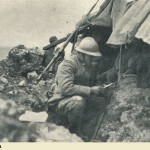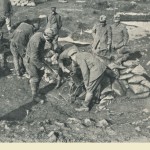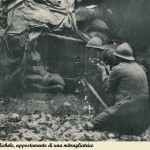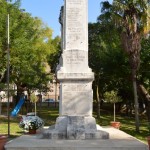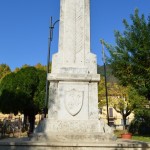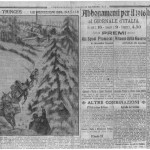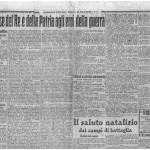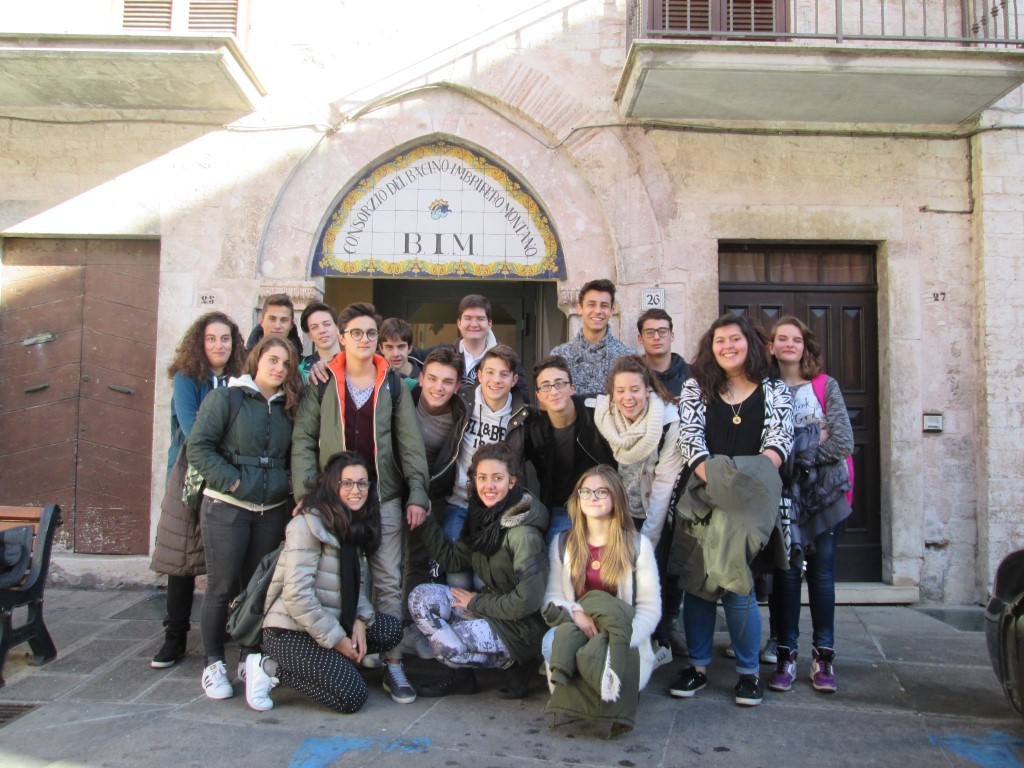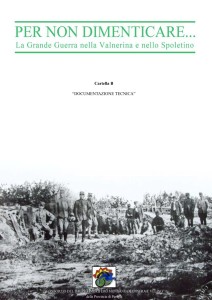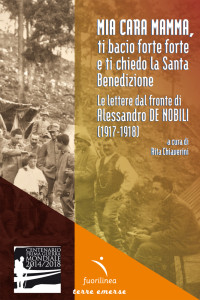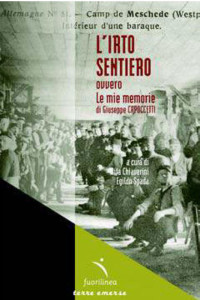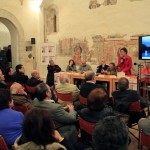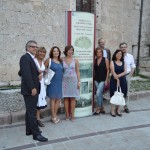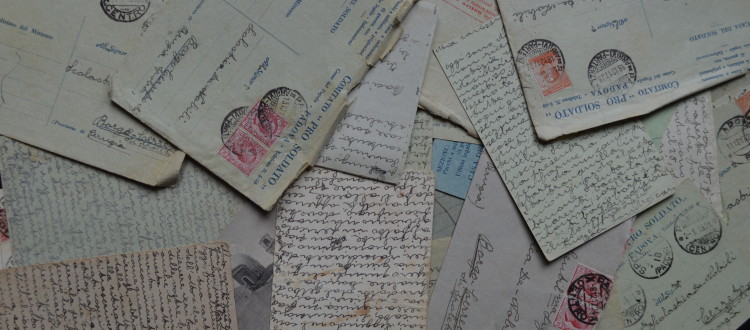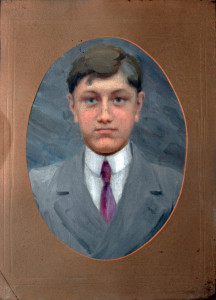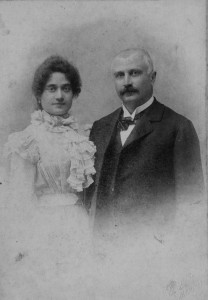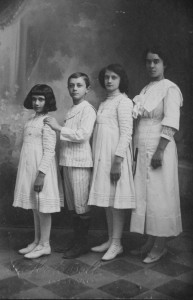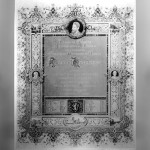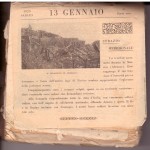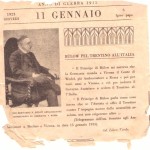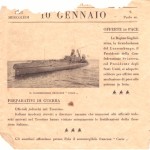Cerreto di Spoleto: Letters of Alessandro de Nobili (1917-1918) published thanks to the project consortium Bim
Alessandro De Nobili family called with the diminutive of Sandro, son of the Prefazio and Scolastica Argentieri, is one of 1,400 young telegrapher who died during the First World War. A small cardboard oval box – preserved by the family of Nicola Tella, great-grandson of Sandro – contains all that remains of his short life: letters and postcards that have almost a hundred years and the ability to make real, concrete and present a time away, a dramatic time, that of the Great War.
The letters tell the story of a boy of eighteen years old, he lost his father at age seven, only son of three children in a social and cultural context in which to have male heirs was considered still relevant. Sandro grows with his mother and two sisters – Carola and Bianca – in Borgo Cerreto, a small village in the municipality of Cerreto di Spoleto, near Perugia.
In June of 1917, when Sandro receives the call to arms, it has just been fired from the school V gymnasium ‘Royal Lyceum Pontano Sansi’ of Spoleto, after having supported the remedial examination in italian, math, latin and greek. Does not shine academically, it is just enough, but conduct flawless and extremely respectful to the institutions and people feature we will face during the military experience. Sandro has a physique minute: we deduce from the sheet of military service where is the height of 1 meter and 62 centimeters and a chest of 81 cm, which in any case comply with the parameters of the time. He has brown hair and smooth; brown eyes; a nose called ‘greek’; chin regular; healthy teeth and rosy. Physical characteristics that we find in the painting that shows him and is still kept by the family in the house of Borgo Cerreto.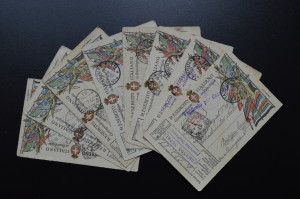
Sandro’s family is wealthy and influential. The maternal line belongs to the ancient and illustrious families of Norcia; uncle Giovan Battista Argentieri Scarduzzi, said Titta, is mayor of Cerreto di Spoleto while another uncle Vittorio Argentieri is a lawyer who while living in Rome has not severed ties with the place of origin is so much so that city councilman Norcia as well as adviser of the Province of Umbria and it is taken into account by the deputy of reference for the area of Spoleto and Valnerina, the Hon. Carlo Schanzer, the latter a close friend of Giolitti, as well as Minister for Posts and Telegraphs 1906-1909.
From the letters of the young Sandro, it shows a very strong attachment to his family and especially his mother although surprisingly the formality of the past in sending greetings at the end of every written, “Say hello to all, kisses his dear sisters, to you I ask the Holy Blessing your most affectionate son Sandro” but, here and there, emerges affection “mammetta cara (dear)” and longing for his family, home and country of origin.
The correspondence has a historical and documentary since it is the testimony of a great historical event – the First World War – as seen through the eyes of a young man belonging to the bourgeoisie of the Valnerina, with a family provided numerous, well-branched friendships, which seeks use it to your advantage. It seems to read the letters that John Comisso, he enlisted, even as a volunteer, in the 3rd genius telegrapher, wrote from the front, or rather from the back to the parents during the long years of the Great War, a real diary which Comisso he used for his books, in particular “Days of War” (1930) and “My Seasons” (1925), and in which war is experienced as a holiday, as an escape, as an adventure as the protagonist sees the war from afar, from the sidelines and does not give up his small comforts: a bed with sheets, wool sweaters, the mom’s good food especially recommendations for comfortable seats in the rear. Unlike Sandro, Comisso, agree to follow the course of official and, from graduated, will live the experience of the defeat of Caporetto and the Battle of Vittorio Veneto.
The letters of Sandro De Nobili not tell battles, heroism, epic pages: tell the normality of a family that is disrupted by the departure of his son to the front. Sandro wants to do the telegraphist, and so fulfills his duty to the Fatherland even though – as emerges from the letters – to go to war not exalted indeed, with great spirit of resignation, hopes to return home soon to resume their studies and his life as a civilian.
The letters of Sandro, certainly repetitive and to reassure the family, in fact, are able to betray here and there details and deep emotions: the initial hope of realizing his dream to become a good boy and telegraphist with the passage of time gives way to a resigned awareness event that is sweeping. Just to survive it is willing to compromise and settle for becoming regimental postal worker. Despair, finally, will blow his every dream, to the point that will push him to say in one of his last letters “Don’t worry, that the first hole that we will I holed up”.
Sandro also write letters or receive mail has the effect of therapy, it becomes a way of self-preservation, to ease the pain of the distance and the difficulties of the present. This explains the almost obsessive need to receive mail, testified so richly expressed and not infrequently with an obstinacy otherwise difficult to explain. The letters for Sandro, as for all the soldiers, are a basic need, as they constitute the continuation of its existence before the war, with their family and to their community.
In his letters, Sandro does not tell much, just hints of what happens because it is well aware of the complaint and the strict requirements of the army postal service:
« 1) DO NOT write letters of more than four pages.
2) DO NOT use envelopes lined.
3) DO NOT use conventional language, figures, signs, etc.
4) DO NOT forget the details of your name and department.
5) DO NOT TALK ABOUT THINGS OF WAR.
6) DO NOT indicate the place where you are.
7) DO NOT send photographs or postcards of countries in the war zone.
8) DO NOT put money in the letters.
9) DO NOT MAIL BOURGEOIS set in».
In the letters, there is also a form of self-censorship and to reassure and self-reassure, to give courage and bravery. Appoint their fears it means give it strength, while the goal is to overcome because there is no choice and, therefore, is unnecessary worry the family.
Traduzione a cura di Andrea Ansuini












